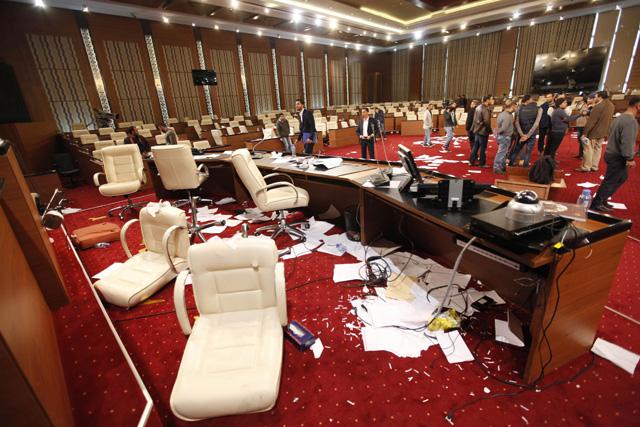You are here
Deadly attacks, low turnout mar Libya election
By AFP - Jun 26,2014 - Last updated at Jun 26,2014

TRIPOLI — A deadly attack on troops, the killing of a rights activist and low turnout marred a parliamentary election Libyan authorities hope will end the political turmoil rife since the ouster of Muammar Qadhafi.
Seven soldiers deployed to provide polling day security in second city Benghazi were killed, and 53 injured, in what security officials said was an attack on their convoy by Islamist militia.
Later lawyer and human rights activist Salwa Bugaighis was shot dead by unknown assailants at her home in Benghazi, hospital and security sources said.
Bugaighis, a former member of the National Transitional Council, the 2011 anti-Qadhafi rebellion’s political wing, was vice president of a preparatory committee for national dialogue in Libya.
The eastern city, which was the scene of a deadly 2012 attack on the US consulate, has been tense since a rogue former rebel commander launched an offensive against powerful Islamist groups late last month, drawing many regular army units to his side.
The electoral commission was also forced to close 18 polling stations in the western town of Al Jemil after unidentified gunmen attacked five of them and stole ballot boxes, a local security official said.
By the time polls closed at 1800 GMT on Wednesday, just 630,000 of the 1.5 million registered voters had cast their ballot, a 47 per cent turnout, according to preliminary estimates by the electoral commission.
The number of registered voters itself is a far cry from the more than 2.7 million who signed up two years ago for Libya’s first ever free election. Almost 3.5 million Libyans are eligible to vote.
A patchwork of militias
In the past few weeks, Libya has been rocked by a crisis that sees two rival Cabinets jostling for power in a crippling showdown between Islamists and liberals, as violence raged in the east.
A patchwork of militias, including Islamic extremists, who helped overthrow Qadhafi in the 2011 NATO-backed uprising have been blamed for violence that has continued unabated since then.
“These are the last chance elections. We are placing much hope in the future parliament to restore the security and stability of our country,” said Amr Baiou, 32, as he emerged from a polling station in Tripoli.
No voting was held in the eastern town of Derna, a stronghold of jihadists, for fear of attacks on polling stations.
In the south, just five out 15 polling stations opened in the Kufra region for “security reasons”, the electoral commission said.
Interim Prime Minister Abdullah Al Thani said the election was “proceeding normally”.
“Regarding the organisation of voting in Derna, there will be measures to take this week,” he added without elaborating.
The heavily armed rebels who ousted and killed Qadhafi have carved out their own fiefdoms in the deeply tribal country, some even seizing oil terminals and crippling crude exports from a sector key to government revenues.
The General National Congress (GNC), or parliament, which has served as Libya’s highest political authority since the revolt, was elected in the free July 2012 polls.
But it has been mired in controversy and accused of hogging power, with successive governments complaining its role as both executive and legislative authority has tied their hands in taming militias.
First results Friday or Saturday
The crisis came to a head in February when the assembly, whose term had been due to expire, decided to prolong its mandate until December.
That sparked street protests and forced lawmakers to announce the election.
Voters are choosing from among 1,628 candidates, with 32 seats in the 200-strong GNC reserved for women and would-be MPs banned from belonging to any political party.
The first results are expected on Friday or Saturday.
The UN Security Council has expressed hopes that the vote can be a stepping stone out of the chaos.
“These elections are an important step in Libya’s transition towards stable democratic governance,” it said this week.
For analyst Salem Soltan, none of the candidates standing in the elections “carry the political or social weight” needed in the assembly.
The new parliament risks “being run by shadow MPs, who will act according to instructions from warlords and militias,” he said.
But some of those taking part in Wednesday’s poll disagreed.
“We are voting so as not to repeat the mistakes of the past,” said Salah Al Thabet.
“We voted in the first elections just to vote. This time I have really researched the candidates, and I voted for the right people,” added the 62-year-old pensioner, after casting his ballot in central Tripoli.
Related Articles
Libyans were voting Wednesday in a legislative election the authorities hope will end political turmoil and deadly violence that has gripped the country since the ouster of Muammar Qadhafi.
Libyans trickled to the polls on Thursday to elect an assembly to draft a constitution, with the paltry turnout reflecting deep political disillusion with the chaos pervading Libya since Muammar Qadhifi’s 42-year rule ended in 2011.
Libyan authorities vowed Monday to pursue a democratic transition in the face of mounting lawlessness after two MPs were shot when protesters stormed the country’s transitional parliament.



















